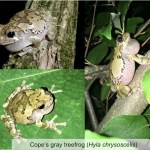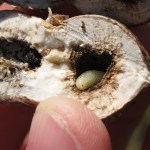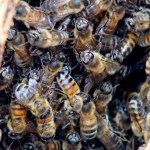freeze tolerance
Dr. Clara do Amaral is a postdoctoral fellow at the University of Dayton in Ohio where she studies freeze tolerance in frogs. She received a Research Recognition Award from the Comparative and Evolutionary Physiology section of the American Physiological Society at the 2017 Experimental Biology meeting in Chicago, IL. She prepared this award-winning guest blog entry to describe her interesting research:
The Cope’s gray treefrog is a small frog that occurs in the eastern United States. You can find it sitting on the trunks and branches of trees, and you can hear it calling from the…
I have heard of some animals using sugars as antifreeze (check out the prior blog on wood frogs that freeze and survive!), but never lipids.
Image from http://thebuggeek.com/tag/eurosta-solidaginis/
Researchers have discovered that larva of the Goldenrod gall fly (Eurosta solidaginis) shown above survive nearly freezing solid as well, which they hypothesize may be accomplished by accumulating acetylated triacylglycerol, or agTAGs, (i.e. a type of lipid) during winter. They found that the flies accumulate this lipid from September through March and studies of the agTAGs show that this…
The Comparative and Evolutionary Physiology section held their Scholander Poster competition for young comparative physiologists today! It was exciting to see all of the students present their work.
Here are some of the highlights:
Raffaele Pilla, Dominic P, D'Agostino, Carol S. Landon, and Jay B. Dean from Molecular Pharmacology and Physiology, University of South Florida, Tampa, FL. These researchers demonstrated that a ketone body, often thought of as waste products resulting from the use of fats for energy, can have protective effects against seizures caused by exposure to…
I was recently sent this intriguing question from a reader:
Dear Dr. Dolittle,
I heard in my science class that because honeybees have such high blood sugar levels, they can survive freezing...is that true?
To answer this question, I turned to expert Dr. John G. Duman from the Department of Biological Sciences at the University of Notre Dame who studies antifreeze proteins in insects. Here is what he had to say:
In short, no.
Insects generally survive subzero environmental temperatures by evolving one of two strategies. Some are freeze tolerant, meaning that they can survive the freezing…


